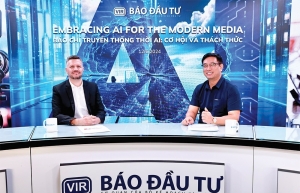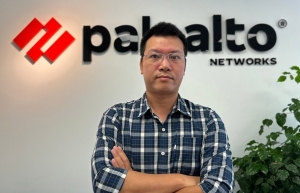AI and data analytics shaping future of businesses
In a developing region such as ASEAN, adoption of technology is high due to its digital connectivity and young population. ASEAN is currently the fifth-largest economy in the world and is projected to move up to be fourth-largest by 2030. In the next decade, ASEAN is expected to grow as one of the fastest growing regions in the global economy and to build dominance in Asia-Pacific. In addition, about 60 per cent of ASEAN’s total population is currently under 35 years old.
 |
| Dr. Carrine Teoh, chief strategy officer Bond Holdings |
For Vietnam, the potential is tremendous. With internet connectivity close to 80 per cent and growing, Vietnam is ready for expansion, and much more can be achieved with digitalisation and technology such as AI.
As technology continues to evolve, our businesses keep innovating. AI can be used to improve business in many aspects, from internal processes to external engagements. For business processes, AI enables automation for repetitive tasks in the area such as accounting, IT operations, human resources, supply chain and logistics, and sales and marketing. It is able to speed up, simplify, and redefine traditional processes to make it seamless and effective.
AI-assisted tools are highly effective in sales and marketing as they are able to provide targeted and intelligent marketing based on the data analytics. This helps business to understand the customers’ preferences, needs and wants better. For an AI tool to be powerful and mature, it needs to be populated with the necessary datasets and time to learn.
The industries which will benefit tremendously from AI and data analytics are cybersecurity, financial services, manufacturing, healthcare, and education.
As nations and economy move towards digitalisation, to improve efficiency and increase quality of life, cybersecurity becomes the pillar to secure and protect the realm. The introduction and application of AI and data analytics in cybersecurity give a tremendous edge in detecting threats, analysing attacks, automating incident response to mitigate damage and understand security controls effectiveness.
In financial services, AI provides insights and intelligence for financial data analytics, e-verification processes, financial performance measurements, fraud detection and prevention, and personalised banking and financial services. In a growing economy like Vietnam, the use of AI in the financial sector will be a key differentiator.
Manufacturing is another sector that can be synergised with AI. The introduction of AI begins at the conceptualisation and design stage, as AI can analyse market trends, study product research, and market feedback to provide the necessary inputs and ideas to generate innovative designs. With AI and data analytics, manufacturers can have autonomous supply chain performance, with little human oversight. Maintenance can be predictive and proactive and quality checks can be automated, with AI and data analytics identifying patterns in production data.
AI is reinventing and reinvigorating healthcare. AI makes research and development on drug discovery more efficient in costing and time, being able to predict side effects and identifying candidates for clinical trials. Medical diagnostic is another exciting AI healthcare application, being able to predict and diagnose disease faster and with higher accuracy. AI-assisted surgeries using robots have higher precision, leading to fewer complications and quicker recovery time.
In education, AI can be used to augment the role of teachers by supporting and automating routine duties and tasks of teachers. AI and data analytics are promising in revolutionising students-focused assessments to give invaluable insights for students to learn and excel, with personalised learning contents and experiences.
While the transformative potential of AI is tremendous and undeniable, we should embrace the technology with governance and knowledge with regard to moral, legal, and social aspects to leverage on these capabilities.
We must navigate the complexities of AI ethically, understand the power of data analytics, and protect the privacy and security of the users to ride on the magic of AI.
There are guidelines and governance frameworks being developed, namely UNESCO’s Recommendation on the Ethics of Artificial Intelligence and the EU’s Ethics Guidelines for Trustworthy AI. ASEAN has also published a guide on AI Governance and Ethics thsi year.
Markets around the world, namely the US, EU, China, Canada, and Australia, are stepping up on legal frameworks and AI regulations to emphasise ethical applications and social benefits as AI technology is shaping our future.
 | New AI offerings pose more questions The AI explosion is continuing at pace with new offerings from the biggest tech groups in the world, but ethical concerns and investing considerations are taking up more focus as industries like the media and manufacturing adjust their priorities. |
 | Redefining the journalism landscape in the age of AI With the recent rise of AI, some journalists and media agencies are fearing an invasion where their journalistic work is used (sometimes without permission) as sources to generate personalised content, or to support social media users in their own quest to become opinion leaders. |
 | AI-powered solutions to be adequate response to threats Toying around with the latest generative AI tools has been entertaining for many. Yet, AI has long transcended personal use, profoundly reshaping organisational and business activities. |
What the stars mean:
★ Poor ★ ★ Promising ★★★ Good ★★★★ Very good ★★★★★ Exceptional
 Tag:
Tag:
Related Contents
Latest News
More News
- Citi economists project robust Vietnam economic growth in 2026 (February 14, 2026 | 18:00)
- Sustaining high growth must be balanced in stable manner (February 14, 2026 | 09:00)
- From 5G to 6G: how AI is shaping Vietnam’s path to digital leadership (February 13, 2026 | 10:59)
- Cooperation must align with Vietnam’s long-term ambitions (February 13, 2026 | 09:00)
- Need-to-know aspects ahead of AI law (February 13, 2026 | 08:00)
- Legalities to early operations for Vietnam’s IFC (February 11, 2026 | 12:17)
- Foreign-language trademarks gain traction in Vietnam (February 06, 2026 | 09:26)
- Offshore structuring and the Singapore holding route (February 02, 2026 | 10:39)
- Vietnam enters new development era: Russian scholar (January 25, 2026 | 10:08)
- 14th National Party Congress marks new era, expands Vietnam’s global role: Australian scholar (January 25, 2026 | 09:54)




















 Mobile Version
Mobile Version